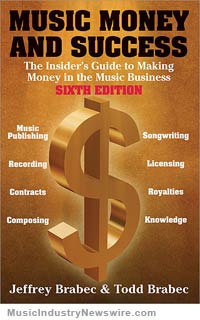Music, Money and Success
MuseWire COLUMN: The title of this article is the same as the title of a book that should be owned by every songwriter and music publisher. That book is: “Music, Money and Success: The Insider’s Guide to Making Money in the Music Business,” Sixth Edition, by Jeffrey Brabec & Todd Brabec (Schirmer, $24.95, 524 pages, ISBN 13: 978-0-8256-7346-7).
 Brabec (Todd) is a music industry consultant and former Executive Vice President and Worldwide Director of Membership for ASCAP. Brabec (Jeffrey) is Vice President of Business Affairs for the Chrysalis Music Group and has negotiated more than 1,000 movie, television, video, new technology and advertising commercial agreements for writers, writer-recording artists and writer-producers. Both are entertainment law attorneys and graduates of the New York University School of Law.
Brabec (Todd) is a music industry consultant and former Executive Vice President and Worldwide Director of Membership for ASCAP. Brabec (Jeffrey) is Vice President of Business Affairs for the Chrysalis Music Group and has negotiated more than 1,000 movie, television, video, new technology and advertising commercial agreements for writers, writer-recording artists and writer-producers. Both are entertainment law attorneys and graduates of the New York University School of Law.
Sources of Income
True to their subject matter, the Brabecs begin the book with a list of income sources for songwriters and music publishers. From albums to webcasts, the list includes both old and new media. There are sixty-six items on the list and they devote twenty-six pages to describing many of them, often with real-life monetary examples for you to use as a guide.
Practical Advice
If you are looking to find information you can use in your music career, you’ve come to the right place with this volume. They take a couple of pages to list the 22 “most important points in every recording contract.” Then they devote the next 50 pages to explaining them to you in plain, everyday English that we non-lawyers can easily comprehend.
There is data in this book that you really need, including facts about changes in basic record contract clauses such as “A review of what recording costs should not be recoupable from artist’s royalties,” “The sharing of some types of income on a 50/50 net basis,” and “Reasonable audit costs and interest.”
Entire chapters are devoted to such issues as sampling, music in television, music in the movies, and music in commercials. And yes, budgets are discussed. Just think about the price of the book compared to the value you will receive from reading the pages in the section titled “Negotiating the Television License for a Song.” Fortunately, that kind of important information can be found in every chapter.
Scenarios
From time to time throughout the book, the Brabecs include miniature scripts illustrating certain types of conversations songwriters or publishers will have with business people seeking licensing of their music. Not only is it entertaining to read these scenarios, it is quite instructive to study the terms, requests, offers and counter-offers in “The Phone Call from the Film Company,” “The Phone Call from the Advertising Agency,” and so forth.
New Media
While both of the Brabecs have plenty of old school experience, they are not only aware of the technological alterations that have affected the entire music business, but they fully embrace these changes and challenges.
Consider this sentence from the opening of their lengthy chapter on new media: “Internet service providers, digital rights management, podcasting, blogs, compression, downloads, wireless, streaming, subscription and non-subscription services, MP3, hyper-distribution, encryption, decryption keys, platforms, interactive music, portability, mobile devices, watermarking, fingerprinting — these words and many more form the vocabulary of the new music business.”
In the sections dealing with those topics, the Brabecs do not shy away from using firm examples, often right down to the dollars and cents results of making certain business decisions. (Or perhaps I should have gone with the pun and said “dollars and sense” results.)
Over There
Towards the end of the book is a good-sized chapter on income from foreign countries, a topic of concern to everyone making or marketing music. They provide you with an excellent perspective on subpublishing agreements as well as the importance of obtaining “at source” royalty payments (if you don’t know, look it up or buy the book). They even give you a list of fifty-eight foreign performing rights societies.
Before You Sign that Contract
On pages 467 to 486, you will find sample contracts for six of the most-often-utilized deal situations:
* Use of a song in a motion picture
* Use of a song in a television series
* Use of a song in an advertising campaign
* Digital download license
* Video game music license
* Mechanical license
Forewarned is forearmed. Reading these before you are handed a contract will enable you to familiarize yourself with some of the terminology and concepts. At the very least, looking at this material will give you a better idea of what to ask your attorney.
I could go on describing tidbits of data from such chapters as “Music, Money, Lawyers, Managers and Agents,” “Breaking into the Business” and “Guide to Music Industry Organizations,” but if you don’t want the book by now, you never will.
Article is Copr. © 2010 by John Scott G. – all rights reserved.


